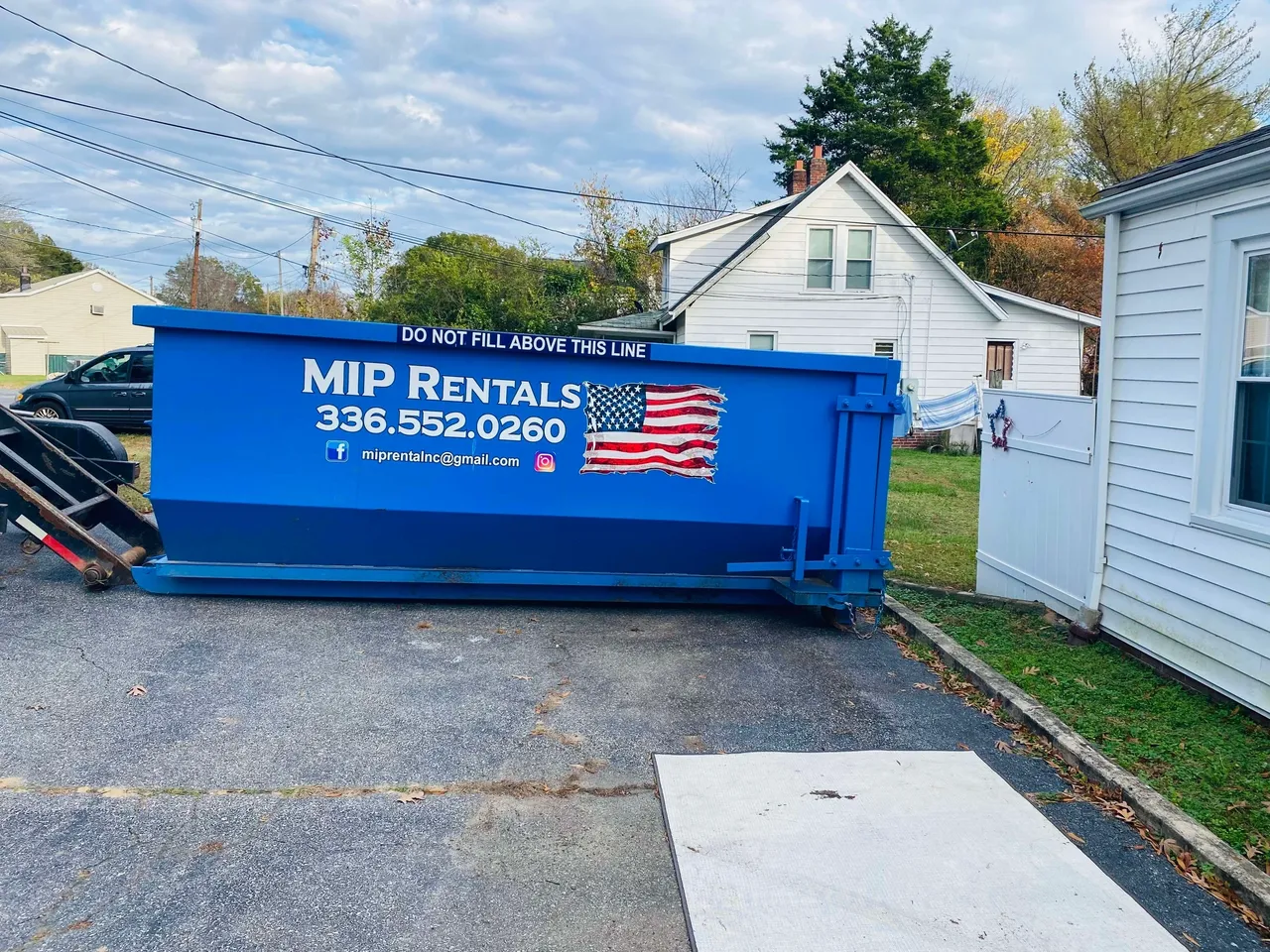Booking a dumpster rental should be easy. But if you’re not careful, it can turn into a costly mess. Choosing the wrong size, loading it the wrong way, or not knowing the rules can all lead to problems.
This guide breaks down the most common dumpster rental mistakes and how to avoid them. Whether you’re cleaning out your garage, remodeling your home, or working on a yard project, these tips will help you save time and money.

Why People Rent Dumpsters
People rent dumpsters for all kinds of projects:
- Home cleanouts or garage cleanups
- Remodeling or renovation work
- Moving out or downsizing
- Yard work and landscaping
- Roof repairs or demolition jobs
Dumpster rentals help make big cleanups easier and faster. Instead of making multiple trips to the landfill, you can toss everything in one place and let the company haul it away.
Knowing what you’re working on helps you figure out the right dumpster size and rental length.
Choosing the Wrong Dumpster Size
Picking the wrong size is one of the most common mistakes. A bin that’s too small means you’ll need another one. A bin that’s too big costs more than you need to spend.
Dumpster sizes usually range from 10 to 40 yards. Choosing the right size depends on what you’re throwing out and how much of it there is.
Here’s a quick breakdown of common sizes:
- 10-yard dumpster – Good for small cleanouts, like a single room or minor yard work.
- 15-yard dumpster – Works well for medium-sized cleanups or remodeling a single room.
- 20-yard dumpster – A popular choice for whole-home cleanouts or larger renovations.
- 30-yard dumpster – Best for major construction or large volumes of bulky debris.
- 40-yard dumpster – Ideal for commercial projects, demolitions, or full building cleanouts.
Ask the rental company what size they recommend based on your project.
Not Asking What’s Allowed Inside
You can’t just throw anything in a rental dumpster. Some items are banned because they can be harmful or need special disposal. If you toss in something you’re not supposed to, you could get hit with extra fees.
Here are some of the most common items that are often not allowed:
- Tires – Need special disposal and are usually not accepted.
- Paint and paint cans – Often considered hazardous unless dried out.
- Batteries – Can leak harmful chemicals.
- Chemicals or solvents – Dangerous to handle and dispose of.
- Appliances – Some may contain refrigerants or electronic parts that need special handling.
Always ask for a list of allowed and banned items before loading your dumpster.
Overloading the Dumpster
It’s easy to overfill a dumpster without realizing it. But if you go past the top or go over the weight limit, the truck might not be able to pick it up. That can lead to extra fees or delays in having your waste removed.
Here’s how to load it the right way:
- Stay below the fill line – Don’t let trash rise above the top edge of the bin.
- Distribute weight evenly – Spread heavy items across the bottom, not all in one spot.
- Break down bulky items – Flatten boxes and cut up large pieces to save space.
- Avoid packing too tightly – Don’t wedge items so tight that they’re hard to remove.
Loading the dumpster properly keeps things safe, avoids damage, and helps you stay within weight limits.
Putting the Dumpster in the Wrong Spot
Where you place the dumpster matters. You need a flat, open area that’s easy for the truck to reach. The wrong spot can cause problems with access, safety, and even damage your property.
Here are a few placement tips to follow:
- Use a flat, hard surface – Avoid soft or uneven ground that can cause the dumpster to sink or tip.
- Leave enough space – Make sure the truck has room to drop off and pick up the dumpster safely.
- Stay clear of trees and wires – Low branches or overhead wires can block delivery.
- Avoid tight spots – Don’t place the dumpster where it’s hard to reach or back out of.
- Protect your driveway – Use boards or plywood under the wheels to prevent damage.
Ask the rental company where they recommend placing the dumpster based on your space.
Put boards or plywood down if you’re worried about driveway damage. Ask the rental company where they suggest placing it.
Skipping Permits or Local Rules
Not checking your local rules can lead to fines or delays. Some towns require a permit if you place the dumpster on a street or sidewalk. Others have specific rules about where you can put the dumpster and how long it can stay.
Here’s what to do before your dumpster arrives:
- Ask your town or city hall – They can tell you if a permit is needed.
- Check if HOA rules apply – Some neighborhoods have their own rules.
- Confirm street placement rules – Dumpsters on public roads often need permits.
- Ask your rental company – They may help with getting permits or provide guidance.
It’s better to ask ahead than to get fined or have your dumpster removed early.
Booking Too Late
Waiting too long to reserve a dumpster can cause problems, especially during busy times of the year. Spring and summer are popular seasons for cleanouts and renovations, and dumpsters often get booked up quickly.
Here are a few tips to avoid scheduling issues:
- Book early – Try to reserve your dumpster at least a few days ahead of time.
- Check availability during peak seasons – Call ahead if you’re planning around holidays or weekends.
- Be flexible with drop-off times – Allow a window of time for delivery and pickup.
- Know your timeline – Plan how long you’ll need the dumpster so you’re not rushed.
Planning ahead helps you get the right size and delivery date without stress.
Not Reading the Fine Print
It’s easy to overlook the details in your rental agreement. But ignoring the fine print can lead to surprise fees and charges you weren’t planning for.
Look out for these common hidden costs:
- Fuel charges – Some companies add a fee based on delivery distance.
- Overage fees – If your load is too heavy, you may have to pay more.
- Extra days – Keeping the dumpster longer than agreed can cost extra.
- Trip fees – If the company can’t access the dumpster, they may charge for the failed pickup.
Ask for a full breakdown of costs before you book. That way, there are no surprises.
Going for the Cheapest Option
A cheap price might sound like a great deal at first, but it can lead to problems later. Some companies advertise low prices but hide extra fees or offer poor service.
Here’s what to look for instead:
- Clear, upfront pricing – Make sure all fees are explained before you agree.
- Good customer reviews – See what past customers say about their experience.
- Reliable service – On-time delivery and pickup make a big difference.
- Helpful support – A company that answers your questions quickly can save you trouble later.
Spending a little more for a trusted company will help your project go smoother and avoid surprise costs.
Forgetting to Ask About Recycling
Some dumpster rentals allow you to recycle materials like metal, cardboard, or yard waste. Others don’t.
Ask if your waste can be sorted to save money or reduce trash going to the landfill.
Tips for First-Time Dumpster Renters
- Know what type of waste you have
- Ask what’s included in the rental price
- Double-check weight limits
- Find out what can’t go in the bin
- Plan the drop-off location ahead of time
Frequently Asked Questions
What size dumpster should I get for a home cleanout?
A 15- or 20-yard dumpster usually works for most home cleanouts. It depends on how much junk you’re getting rid of.
Can I throw away furniture and mattresses?
Most companies allow furniture. Mattresses may cost extra or need special handling.
How long can I keep the dumpster?
Most rentals are for 7 to 10 days. If you need more time, you can usually extend it for a small fee.
Do I need to be home when it’s delivered or picked up?
Not always, but it helps if your driveway is tight or hard to find. Leave clear instructions just in case.
Can I put yard waste and junk in the same bin?
It depends on the company. Some allow mixed loads, but others want them separated.
What if it rains while I have the dumpster?
Rain won’t hurt the dumpster, but it can make your trash heavier. Try to cover it with a tarp if possible.
Book Your Dumpster the Right Way
Avoiding these common dumpster rental mistakes can help your project go smoothly. MIP Rentals offers honest prices, friendly service, and local support to make it easy.
Visit MIP Rentals to get started, or Contact Us with any questions. You can also email us at miprentalnc@gmail.com. can help your project go smoothly. MIP Rentals offers honest prices, friendly service, and local support to make it easy.


